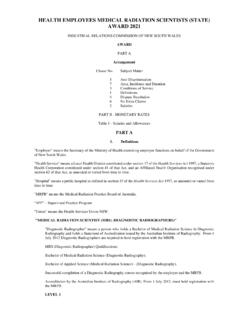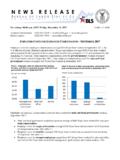Transcription of National Maintenance Agreement - NMAPC
1 Effective January 1, 2012 Building a Partnership ofSafety, Productivity, Quality, and 11/13/15 8:26 AMMISSION STATEMENTNATIONAL Maintenance AGREEMENTSBUILDING A PARTNERSHIPOFSAFETY, PRODUCTIVITY, QUALITY AND STRENGTH1 Effective January 1, 2012 Since its inception in 1971, the National Maintenance Agreements Policy Committee, Inc. Program ( NMAPC Program) has been administered under a system of tripartite gover-nance and cooperation, with Owners, Contractors and building trades Craft Workers shar-ing equally in the responsibilities and rewards generated by the NMAPC that the NMAPC Program s viability is equal only to the sum of its parts, careful consideration has been given over the years to ensure that proper balance is main-tained among the three participants in the NMAPC Program. Such balance is necessary if the NMAPC Program is to maintain its stated goal of Building a Partnership of Safety, Productivity, Quality and Strength.
2 In achieving that goal, the National Maintenance Agreements Policy Committee, Inc. ( NMAPC ) recognizes and addresses the following common concerns of the partners: F Safety in all phases of work F No disruptions of Owner s work F Performance on schedule F Cost-effective and quality craftsmanship F Productivity flexibility F A trained, available workforce F Attainable work opportunities F Resolution process for job site issues F Consistent terms and conditions By recognizing, addressing, and delivering on these concerns, the NMAPC Program re-flects a true partnership dedicated to providing the most effective tool for the performance of work in industrial construction NMAPC Program is administered and guided by the NMAPC . The NMAPC is a joint committee of labor and management representatives committed to achieving the NMAPC Program s stated goals and satisfying the individual and collective concerns of the , the NMAPC provides a guarantee to Owners, Contractors and Craft Workers that the NMAPC Program will continue to deliver dynamic leadership in addressing the realities of industrial construction, Maintenance , repair, replacement, renovation, and modernization, and that it will continue to provide a state of the art delivery system for the performance of such work.
3 The NMAPC is truly designed to deliver partnerships of Safety, Productivity, Quality and Strength. 11/13/15 8:29 AM2 Effective January 1, 2012 NMAPC Tripartite Principles of Conduct: Contractors and SubcontractorsSince its inception in 1971, the National Maintenance Agreements Policy Committee, Inc. ( NMAPC ) Program has been administered under a system of tripartite governance and cooperation, with Owners, Contractors and building trades Craft Workers sharing equally in the responsibilities and rewards generated by the NMAPC Program. It is under this philosophy of tripartite cooperation and mutually beneficial relationships that the NMAPC has developed three (3) Tripartite Principles of Conduct, to ensure that the Program s stated goal of Building a Partnership of Safety, Productivity, Quality and Strength is adhered to in all phases of Contractors and Subcontractors shall:1.
4 Maintain a Zero Injury, drug-free and productive work place;2. Be signatory to each Participating Union s National Maintenance Agreement (NMA) that you will be employing for the work in question;3. Have filed and received approval of Site Extension Requests (SERs) of the NMAs at any and all affected facilities/locations prior to commencing with work;4. Ensure that all subcontractors under your company s direction are performing work under the terms and conditions of the NMAs as outlined in 1) 5. Conduct mandatory Pre-job Conferences, as well as initiate addressing any potential concerns at such time as outlined in Article I of the NMA;6. Adhere to and enforce the respective International Unions Codes/Standards of Excel-lence;7. Report your work hours performed under the NMAs on a quarterly basis via ;8.
5 Maintain channels of communication with your Union(s), the local building trades coun-cil, and the Owner/Client, as well as participate in local tripartite meetings as necessary;9. Familiarize and utilize existing resolution processes for addressing any disputes that may arise while working under the NMA Program;10. Consistently adhere to, and enforce ALL of the terms and conditions of the NMAs, recognizing that it is every Signatory Contractor s and Subcontractor s responsibility to manage all aspects of their work performed under the 21/13/15 8:29 AM3 Effective January 1, 2012 NMAPC Tripartite Principles of Conduct: UnionsSince its inception in 1971, the National Maintenance Agreements Policy Committee, Inc. ( NMAPC ) Program has been administered under a system of tripartite governance and cooperation, with Owners, Contractors and building trades Craft Workers sharing equally in the responsibilities and rewards generated by the NMAPC Program.
6 It is under this philosophy of tripartite cooperation and mutually beneficial relationships that the NMAPC has developed three (3) Tripartite Principles of Conduct, to ensure that the Program s stated goal of Building a Partnership of Safety, Productivity, Quality and Strength is adhered to in all phases of Participating International & Local Unions shall:1. Maintain a Zero Injury, drug-free and productive work place;2. Take appropriate and timely action regarding requests to become signatory to the Na-tional Maintenance Agreement (NMA), and Site Extension Requests (SERs);3. Participate in all mandatory Pre-job Conferences and initiate addressing any potential concerns at such time as outlined in Article I of the NMA;4. Ensure there are NO disruptions of any and all work performed under the NMAPC Program;5.
7 Adhere to and enforce the respective International Unions Codes/Standards of Excel-lence;6. Fulfill the promise of providing a highly skilled, trained, and professional workforce;7. Maintain channels of communication with your NMAPC Contractors, the local building trades council, and the Owner/Client, as well as participate in local tripartite meetings as necessary;8. Familiarize and utilize existing resolution processes for addressing any disputes that may arise while working under the NMA Program;9. Always respect the Owner/Client s and the Contractor s property, equipment and tools;10. Consistently adhere to ALL of the terms and conditions of the NMAs;11. Remember that the work you perform and the way you perform it each day on the job could ultimately impact the opportunity for your fellow union members and your Contrac-tors to work for this Owner/Client in the 31/13/15 8:29 AM4 Effective January 1, 2012 NMAPC Tripartite Principles of Conduct: OwnersSince its inception in 1971, the National Maintenance Agreements Policy Committee, Inc.
8 ( NMAPC ) Program has been administered under a system of tripartite governance and cooperation, with Owners, Contractors and building trades Craft Workers sharing equally in the responsibilities and rewards generated by the NMAPC Program. It is under this philosophy of tripartite cooperation and mutually beneficial relationships that the NMAPC has developed three (3) Tripartite Principles of Conduct, to ensure that the Program s stated goal of Building a Partnership of Safety, Productivity, Quality and Strength is adhered to in all phases of shall:1. Embrace and promote the Zero Injury philosophy on all projects performed under the NMAPC Program;2. Provide work opportunities to NMAPC Contractors and NMAPC Participating Unions;3. Establish local tripartite committee(s) in order to maintain channels of communication with NMAPC Contractors, Participating Unions, the local building trades councils, and the NMAPC Administrative Office as well as participate in pre-job conferences;4.
9 Ensure Contractors are in possession of approved Site Extension Requests (SERs) at your facility(s) prior to commencing with work by utilizing the Owner/Client portal on ; 5. Ensure Contractors are reporting work hours performed under the National Maintenance Agreements (NMAs) at your facility(s) on a quarterly basis via ;6. Make all Owner/Client rules and regulations known in advance to all parties;7. Consider designating your projects or sites under the NMAPC Yellow Card in order to achieve the maximum benefits of the spirit and intent of the NMAPC Program;8. Provide reasonable access to Union representatives to NMA jobs operated within your plant location(s). 41/13/15 8:29 AM5 Effective January 1, 2012 National Maintenance AGREEMENTSTABLE OF CONTENTSA rticlesArticle I Recognition.
10 6-8 Article II Union Security ..8-9 Article III Nondiscrimination ..9 Article IV Scope of work ..9 Article V Subcontracting ..9-10 Article VI Grievances ..10 Article VII Union Representative ..11 Article VIII Wages ..11 Article IX Benefits and Other Monetary Funds ..11 Article X Compensation Insurance ..12 Article XI Holidays ..12 Article XII Minimum Pay / Reporting Times and Call-ins ..12-13 Article XIII Supervision ..13 Article XIV Travel and XV Work Hours Per Day ..14-15 Article XVI Transportation ..15 Article XVII Safety ..15-16 Article XVIII Apprentices ..16 Article XIX Hiring and Transfer of Craft Workers ..16 Article XX General Savings Clause ..16 Article XXI Crew Size ..16 Article XXII Lockout and Work Stoppage ..17-19 Article XXIII Management Clause ..19 Article XXIV Partnering.


